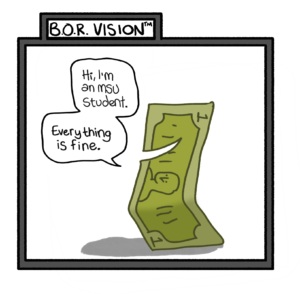Board of Regents approves tuition increase
 The Board of Regents recently approved tuition, housing and dining cost increases for the 2019-20 school year.
The Board of Regents recently approved tuition, housing and dining cost increases for the 2019-20 school year.
Murray State tuition will increase by 1 percent, coming to 42 extra tuition dollars per semester for in-state students and $126 for out-of-state students. Housing fees will get a 2 percent increase and dining fees will get a 2.63 percent increase.
“Tuition is going to experience an increase in price.”
That’s exactly what every college student dreads hearing.
“Nobody likes to see tuition go up; it’s one of those necessary evils.”
That’s what college administrations hiking up school costs always tell us.
While unfortunate, and while students tend to argue it no matter what, those administrations are being truthful.
Universities take a significant amount of money to run. Murray State’s operating budget is $110 million for the 2018-19 school year. By spring, they had fallen short of their projected budget income by $2.3 million.
That kind of thing impacts the way a university can function and takes away from how much the administration can dedicate to certain university funding during the next school year.
The University has to find some way to make up for those missing funds so students can experience the dedication from Murray State they deserve. As sad as it is, increasing tuition rates are seemingly the easiest way to do so.
This does, however, beg the question of what else can be done to make the financial situation a little easier on Murray State. Is money being spent anywhere that can be cut?
For example, $110,000 is spent on cable television for the residential college system. Who do you know that utilizes cable in the dorms? Not many people. Most students get their entertainment from streaming services like Netflix, Hulu or Amazon Prime.
It seems strange that we pay for a service that barely any students use, yet find ourselves in a pickle that has led to the loss of about 30 faculty members.
Talking about the budget is difficult because, as much as it sucks that we complain about it, everything they do is what they deem best. They are working for the benefit of the students and that is all we can really ask from them.
At the same time, however, the schools that raise tuition are the same schools complaining about low enrollment. Murray State is definitely suffering from low enrollment; over the past about four years, we have lost 500 students per year in enrollment.
As a University, we had grown accustomed to having over 11,000 students, and now we have just over 9,000. This is hurting the budget, leading to the tuition increase, which in turn leads to a decrease in enrollment.
Money is always listed within lists of top reasons why students are not enrolling in or continuing their further education, whether you’re out canvassing people or looking at study results.
Increasing tuition is only going to turn people away from applying to Murray State. Many people who are already here end up dropping out because they don’t have the funds to continue. It’s so sad to watch people abandon their education and their dreams all because money is such a disgustingly prevalent thing in our lives.
Raising the cost of housing is a whole other concept; it is cheaper, almost always, to move off campus. For some students, that doesn’t matter because of University requirements forcing in-state freshmen though sophomores and out-of-state freshmen through juniors to live on campus. These students are guaranteed to pay the housing fees, but if you ask most people that live on campus, they are chomping at the bit to move off.
Many people expected the dining increase as so much is being added (and we are very excited for those additions). While it is definitely understandable, the price increase is still dreaded.
The budget is a truly horrid topic, and I can only imagine how much the faculty who create it despise making it. They have to work with money, strangely connotatively bad, while preparing for the backlash of an entire campus. We can hate their work, but we have to remember that these are people who want the best for the students and faculty they work with.






























































































